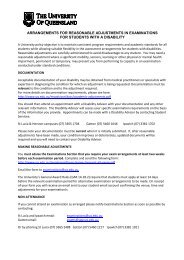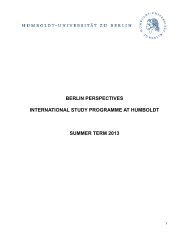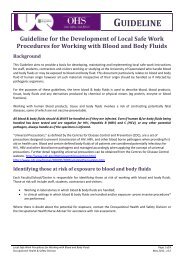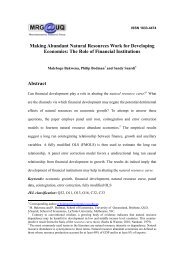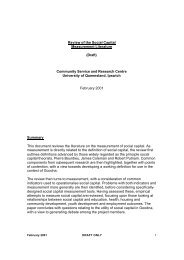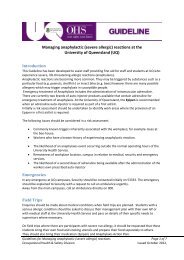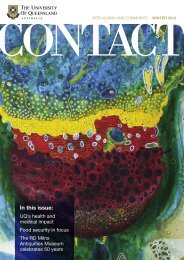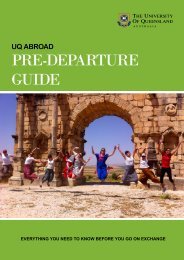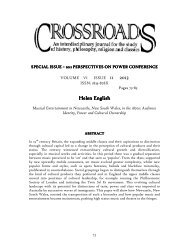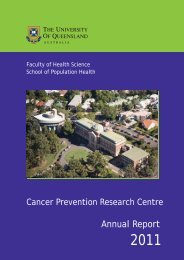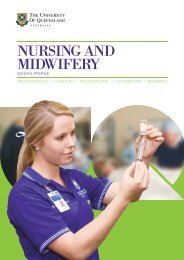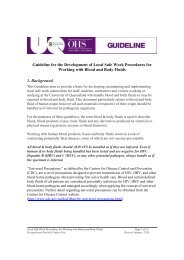Centenary Edition 2010 - University of Queensland
Centenary Edition 2010 - University of Queensland
Centenary Edition 2010 - University of Queensland
You also want an ePaper? Increase the reach of your titles
YUMPU automatically turns print PDFs into web optimized ePapers that Google loves.
+ Cutting edge MARRIAGE EQUALITY<br />
courtesy gordon grigg<br />
Camels GET THE HUMP on rivals<br />
UQ research has found when it comes to<br />
camels, staying cool may be the key to<br />
reproductive success.<br />
Emeritus Pr<strong>of</strong>essor Gordon Grigg, from<br />
UQ’s School <strong>of</strong> Biological Sciences, and<br />
a team <strong>of</strong> colleagues working in Central<br />
Australia, have found male camels have an<br />
ability to drop their body temperature which<br />
may help them last longer in rutting displays.<br />
“Rutting involves very energetic daily<br />
display ‘fighting’ during which bulls contest<br />
ownership <strong>of</strong> a herd <strong>of</strong> females,” Pr<strong>of</strong>essor<br />
Grigg said.<br />
“By starting each day cooler, a bull can<br />
postpone heat stress, compete for longer,<br />
win more contests and potentially sire more<br />
<strong>of</strong>fspring.”<br />
He said the ability <strong>of</strong> camels to drop<br />
body temperature in the mornings, invoking<br />
hypothermia, was once thought to be only a<br />
mechanism for conserving water in very hot<br />
and dry conditions.<br />
“But what we saw cannot be for saving<br />
water as we saw it only in winter, only in bulls<br />
during rut and they had water freely available<br />
and used it routinely,” he said.<br />
“So we speculate that by lowering their<br />
minimum temperature each morning during<br />
rut, bulls increase their chance <strong>of</strong> winning a<br />
harem.<br />
“By starting the day cool, a bull<br />
will enhance his capacity to store heat<br />
generated by the strenuous activity, thus<br />
prolonging the onset <strong>of</strong> heat stress.<br />
“A bull that can sustain a contest<br />
for longer is more likely to win it and, so,<br />
control a herd <strong>of</strong> females and get more<br />
matings.<br />
“That is, the daily hypothermias we<br />
observed could have a direct bearing on<br />
reproductive success.”<br />
Pr<strong>of</strong>essor Grigg said the rutting<br />
habits <strong>of</strong> male camels were fascinating<br />
as competing bulls performed elaborate,<br />
ritualised and intense competitive<br />
behaviour including posing and strutting<br />
side-by-side, inflating and exposing the<br />
dulaa (a sac-like extension <strong>of</strong> the palate),<br />
jostling, exhibiting flehmen (curling the<br />
upper lip), running together and fighting.<br />
Pr<strong>of</strong>essor Grigg was joined by<br />
Jürgen Heuke and Birgit Dörges from the<br />
<strong>University</strong> <strong>of</strong> Braunschweig, veterinarian<br />
Jocelyn Coventry, cattleman Alex<br />
Coppock and School <strong>of</strong> Biological Science<br />
colleagues Lyn Beard and Simon Blomberg<br />
for the project. Their findings have been<br />
published online in scientific journal Biology<br />
Letters.<br />
A national survey conducted by UQ researchers<br />
has found that the majority <strong>of</strong> same-sex<br />
attracted Australians reported marriage to<br />
be their personal preference for relationship<br />
recognition.<br />
The findings dispel the myth that most<br />
same-sex couples do not wish to marry or are<br />
content with de facto status, and form<br />
part <strong>of</strong> the larger Not So Private Lives<br />
survey.<br />
The study is the first national<br />
survey to investigate the<br />
relationship recognition<br />
preferences <strong>of</strong> same-sex<br />
attracted Australians since the<br />
introduction <strong>of</strong> de facto status<br />
for same-sex couples at a<br />
Federal level.<br />
Findings showed that<br />
the majority (54.1 percent) <strong>of</strong><br />
same-sex attracted participants<br />
selected marriage as their personal<br />
choice and close to 80 percent felt<br />
marriage should be an option for<br />
same-sex couples in Australia.<br />
Researcher Sharon Dane,<br />
from UQ’s School <strong>of</strong> Psychology,<br />
said marriage was still the<br />
personal choice <strong>of</strong> the majority,<br />
irrespective <strong>of</strong> the current legal<br />
status <strong>of</strong> participants’ same-sex<br />
relationships.<br />
“Importantly, the majority<br />
showing a personal preference for marriage<br />
was even more substantial among those<br />
currently in a state or municipal civil partnership<br />
or an overseas civil union,” Ms Dane said.<br />
“This suggests that alternatives to marriage,<br />
such as civil unions, can be important for those<br />
who do not wish to marry but are clearly not a<br />
substitute for the many who do.”<br />
stock.xchng<br />
// www.notsoprivatelives.com<br />
Botanical cologne A bottler<br />
stewart gould<br />
Ever wanted to bottle the fresh “green”<br />
aroma <strong>of</strong> a forest? UQ researcher Dr Nick<br />
Lavidis has done just that, launching a<br />
new “eau de grass” spray.<br />
Serenascent, which smells<br />
like cut grass and claims to make<br />
the wearer happier and less<br />
stressed, was launched by the<br />
State Treasurer and Minister for<br />
Employment and Economic<br />
Development, Andrew Fraser.<br />
Mr Fraser congratulated<br />
Dr Lavidis and retired<br />
pharmacologist Associate<br />
Pr<strong>of</strong>essor Rosemarie Einstein<br />
for their seven-year research project.<br />
Dr Lavidis said he first had the idea for<br />
Serenascent on a trip to Yosemite National<br />
Park in America more than 20 years ago.<br />
“Three days in the park felt like a threemonth<br />
holiday,” he said.<br />
“I didn’t realise at the time that it was the<br />
actual combination <strong>of</strong> feel-good chemicals<br />
released by the pine trees, the lush vegetation<br />
and the cut grass that made me feel so relaxed.<br />
“Years later my neighbour commented on<br />
the wonderful smell <strong>of</strong> cut grass after I had<br />
mowed the lawn and it all clicked into place.”<br />
Dr Lavidis said the aroma <strong>of</strong> Serenascent<br />
worked directly on the brain, in particular the<br />
emotional and memory parts known as the<br />
amygdala and the hippocampus.<br />
“These two areas form the limbic system<br />
that controls the sympathetic nervous<br />
system,” he said.<br />
“They are responsible for the ‘flight or<br />
fight’ response and the endocrine system.<br />
The new spray appears to regulate these<br />
areas.”<br />
Serenascent can be puchased online.<br />
// www.serenascent.com<br />
jeremy patten<br />
10 UQ – GRADUATE CONTACT // centenary edition <strong>2010</strong>


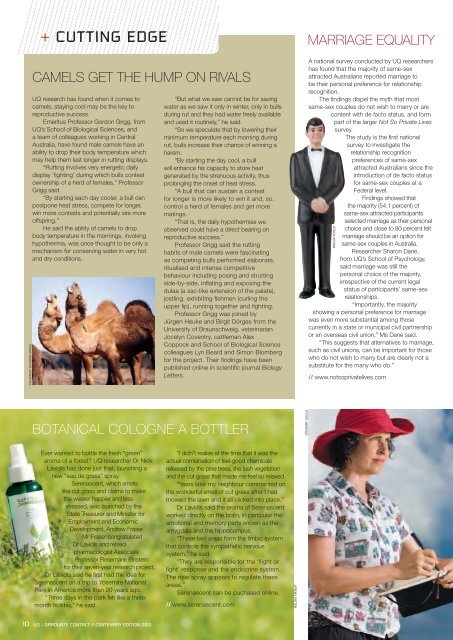
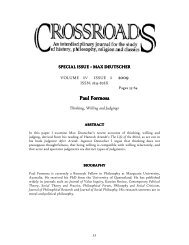
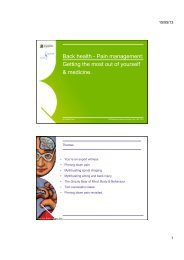
![Recycling [ PDF, 62KB ] - University of Queensland](https://img.yumpu.com/51805185/1/184x260/recycling-pdf-62kb-university-of-queensland.jpg?quality=85)
